Navarre Bible Old Testament, Standard Edition (7 vols.)
Digital Verbum Edition
The Navarre Bible Old Testament, Standard Edition does not include the Bible texts. The print edition cites the RSVCE and the Nova Vulgata, each available separately, or in select Verbum packages.
Overview
Considered by many the best Catholic commentary on the Bible available today, the Navarre Bible series presents seven volumes on the Old Testament. These volumes, compiled by members of the Faculty of Theology at the University of Navarre, Spain, draw on such sources as Church documents, the writings of the Fathers and Doctors of the Church, and the works of contemporary spiritual writers—particularly St. Josemaría Escrivá, who initiated the Navarre Bible project.
Each volume in the Navarre Bible Old Testament, Standard Edition provides extensive commentary on the Scripture. The commentaries include introductions and notes designed to bring clarity to the spiritual and theological message of Scripture. They are both scholarly and readable, presenting an intellectual, historical, and applicable survey of the riches of the Old Testament. With the Logos edition, each Scripture passage is linked with your favorite translation, and is easy to study side-by-side with your other commentaries. You can search by topic or Scripture with lightning fast results!
Want the entire series? The Navarre Bible New Testament, Standard Edition (12 vols.) is also available!
The Navarre Bible Old Testament, Standard Edition does not include the Bible texts. The print edition cites the RSVCE and the Nova Vulgata, each available separately, or in select Verbum packages.
Key Features
- Draws on numerous Catholic resources
- Provides general introductions, introductions to each biblical book, a table of sources cited, maps, and informative notes
Praise for the Print Edition
[The Bible is] presented unambiguously as the inspired Word of God and, with the help of the commentaries, we are introduced to 2,000 years of contemplative Christian reading and living of the sacred Word.
—Osservatore Romano
. . . Superb volume for adult Bible Study . . . most helpful, enlightening, and fascinating.
—Catholic Transcript
Individual Titles
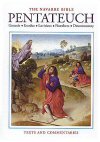
The Pentateuch
- Authors: Faculty of the University of Navarre
- Publisher: Four Courts Press
- Publication Date: 1999
- Pages: 832
The Pentateuch, also known to Christians and Jews as the “Law” (“Torah” in Hebrew), is made up of the first five books of the Bible. Genesis deals with the origin of the world, of man, and of the people of Israel. Exodus is an account of the epic journey of the Israelites from Egypt to the Promised Land. Leviticus deals with ritual holiness and worship. Numbers takes its name from censuses and lists of the Israelites. Deuteronomy, in three great discourses attributed to Moses, describes the later stages of the Exodus.
This handsomely produced volume marks a significant addition to the Catholic Church’s contribution to modern biblical studies . . . This volume seems to offer something very valuable to the modern reader and scholar alike, and I recommend it with great enthusiasm.
—Catholic Herald and Standard
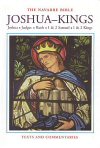
Joshua–Kings
- Authors: Faculty of the University of Navarre
- Publisher: Four Courts Press
- Publication Date: 2002
- Pages: 640
The historical books of the Old Testament recount the fortunes of the people of Israel beginning with the conquest of the Promised Land. Joshua through Kings bring the story up to the point where the independent kingdom of Judah is destroyed by foreign invaders and much of the population deported to Babylon.
This is a book about history, but what it deals with particularly is salvation history; it is part of God’s revelation to mankind and is, therefore of enduring religious interest. Many of the great names of salvation history, as well as their exploits, fill the pages of this volume, and with them the Lord God of Israel engages—wooing them, commanding them, tolerating them, and punishing them for breaking the Covenant made with Moses during the exodus from Egypt.
Here we see Joshua leading the people into Canaan and dividing it among the 12 tribes. During the difficult years of settlement, God raises up leaders to act as judges and saviors—Deborah, Gideon, Jephthah, and Samson, among them. Here too is the delightful story of Ruth the Moabitess, ancestor of David. The prophet Samuel accedes to the peoples’ clamor for a king—anointing first Saul, then David. The volume reports the reign of Solomon—who built the temple of Jerusalem—and the career of the kingdoms of Israel and Judah; it also describes the prophets who strive to keep both kings and people loyal to the Law. Eventually Jerusalem falls, in the year 587. The monarchy is at an end, but the people of God will soon re-emerge from apparent failure, and Jerusalem and the Law will be restored.
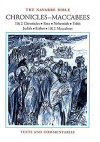
Chronicles–Maccabees
- Authors: Faculty of the University of Navarre
- Publisher: Four Courts Press
- Publication Date: 2003
- Pages: 640
The historical books of the Old Testament recount the fortunes of the people of Israel beginning with the conquest of the Promised Land. The First Book of Chronicles gives the background of the chosen people of God and of the families that made up the 12 tribes; it records, too, the career of David. Second Chronicles begins with Solomon in all his glory and ends with Israel’s ignominious deportation to Babylon. Ezra through Nehemiah record the epic rebuilding of Jerusalem and its temple after the 70-year Babylonian exile. The final books, Maccabees, give vivid accounts of the Jewish experience at a time when Greek successors of Alexander the Great sought to stamp out all traces of the religion of Moses and to replace it with a cosmopolitan pagan ethic.
This, the second of two volumes of “historical books” in the Navarre Bible edition, also contains the three picturesque narratives of Tobit, Judith, and Esther.
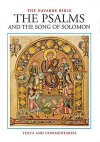
Psalms and the Song of Solomon
- Authors: Faculty of the University of Navarre
- Publisher: Four Courts Press
- Publication Date: 2003
- Pages: 528
Psalms is essentially a book of prayers and praises; most of the psalms are addressed to God, but here we also find proclamations of the works of the Lord, descriptions of man’s plight, curses invoked on enemies, songs in praise of the King or of the city of Jerusalem, and exhortations to the good life. The Psalms date back as early as the time of the great King David, but they are so evocative of the human condition that they articulate the feelings and desires of people in every age. Also included here is the Song of Solomon, or Song of Songs; a blending of love songs, it also celebrates the mutual love between God and the human individual, and between God and His people.
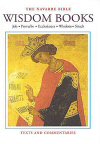
Wisdom Books
- Authors: Faculty of the University of Navarre
- Publisher: Four Courts Press
- Publication Date: 2003
- Pages: 560
While the first five books of the Old Testament (the Pentateuch) record the Law of Moses in the form of commandments, the Wisdom Books propound that teaching in the form of counsels and proverbs. They also reveal the close connection between knowledge that comes through faith, and knowledge acquired through human reasoning.
The book of Job takes the form of a narrative—the story of an upright man who experiences misfortune after misfortune; to a degree, it lifts the veil that shrouds the mystery of suffering. The book of Ecclesiastes helps the believer to appreciate the value of things heavenly. Proverbs consists of seven collections of wise sayings from the ancient Near East. The Wisdom of Solomon, which probably originated in the Jewish community of Alexandria (Egypt), interfaces with the world of Greek culture. Sirach, written by someone steeped in the wisdom tradition of Israel, was much referenced by the early Fathers of the Church.
Reading and reflecting on the Wisdom Books helps prepare the human mind and spirit to receive the Lord and to understand his teaching.
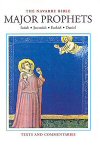
Major Prophets
- Authors: Faculty of the University of Navarre
- Publisher: Four Courts Press
- Publication Date: 2005
- Pages: 896
In the language of the Bible, the words “prophet,” “prophecy,” etc have quite a broad meaning—but all refer, primarily, to the idea of “speaking in the name of God.” The entire Old Testament could be said to be prophetical, but some books carry the names of specific prophets or teachers, twelve “minor” and four “major”—a distinction based on the length of the texts. The books of the major prophets—Isaiah, Jeremiah (with Lamentations and Baruch), Ezekiel, and Daniel—make up this volume of the Navarre Bible.
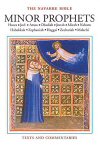
Minor Prophets
- Authors: Faculty of the University of Navarre
- Publisher: Four Courts Press
- Publication Date: 2005
- Pages: 368
In the language of the Bible, “prophecy” has quite a broad meaning—but it refers, primarily, to the idea of “speaking in the name of God." The entire Old Testament could be said to be prophetic, but some books carry the names of four “major” and twelve “minor” prophets—a distinction based on length. Not all of them easy to date, the authors and editors of these books—collectively the “roll of the twelve prophets”—lived sometime between the eighth and second century BC.
The Psalms aside, the books of the prophets are the Old Testament sources most often referenced in the New Testament. Their message covers all aspects of Israelite and Christian faith: belief in One God, his chosen people, the Messiah, and the path to salvation.
Product Details
- Title: Navarre Bible Old Testament, Standard Edition
- Authors: Faculty of the University of Navarre
- Publisher: Four Courts Press
- Volumes: 7
- Pages: 4,464
For the full Navarre Bible, Standard Edition, see here.

- Draws on numerous Catholic resources
- Provides general introductions, introductions to each biblical book, a table of sources cited, maps, and informative notes
[The Bible is] presented unambiguously as the inspired Word of God and, with the help of the commentaries, we are introduced to 2,000 years of contemplative Christian reading and living of the sacred Word.
—Osservatore Romano
. . . Superb volume for adult Bible Study . . . most helpful, enlightening, and fascinating.
—Catholic Transcript
- Title: Navarre Bible Old Testament, Standard Edition
- Authors: Faculty of the University of Navarre
- Publisher: Four Courts Press
- Volumes: 7
- Pages: 4,464
Reviews
14 ratings

Joe Boyle
1/21/2018

Ralph A. Abernethy III
9/7/2017
Michael Kopczewski
10/9/2016
Wesley Walker
4/11/2016
I won the physical versions of some of these and don't want to buy the whole set. I wish I could buy these individually on here :(
Raymond Sevilla
11/29/2014

Faithlife User
9/12/2014

kentuckyliz
8/3/2014
I like how the Navarre quotes the Tradition and the Catechism and the saints...it has a personal application approach included in its treatment of Scripture texts. Make this a prioritized resource in your Bible commentaries, so it's always a right-click away.
Sleiman
6/5/2014

Joseph Valentine
4/22/2014
Excellent, although there are so many volumes it's sometimes complicated to ensure that I have the right commentary linked to the Old Testament books.
Faithlife User
3/2/2014